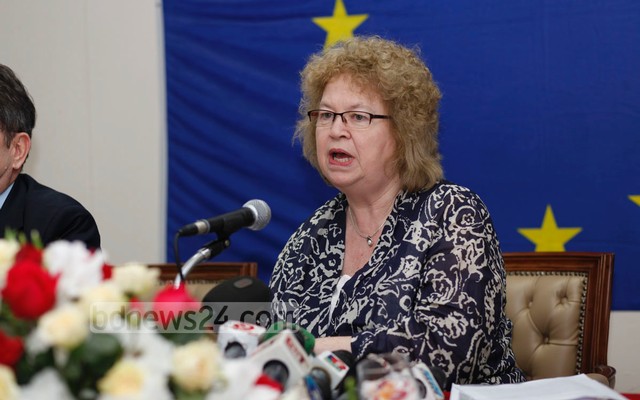The European Parliament will not make any recommendations on the mechanism of overseeing general elections in Bangladesh, but it believes “the earlier the issue is discussed and agreed the better”.
“We’ll not make any recommendation. It’s something to decide by the people of Bangladesh,” lawmaker Jean Lambert, Chair of the European Parliament Delegation related to South Asia, who is leading a delegation in Bangladesh, has said.
She also urged the government to create an environment where bloggers or other free thinkers feel that their freedom of expression was “valued”.
Lambert was replying to questions at a press briefing on Friday, before leaving Dhaka at the end of a three-day visit.
The European Union did not observe the last general elections on Jan 5, 2014 after major opposition BNP’s boycott.
BNP was demanding a non-party interim mechanism for election oversight.
EU Ambassador in Dhaka Pierre Mayaudon said the delegation came to Bangladesh “as part their regular interaction with your country”.
The four-member delegation called on Prime Minister Sheikh Hasina, the Foreign Minister, Law Minister, Commerce Minister, and BNP Chairperson Khaleda Zia among politicians.
Richard Howitt of Britain’s Labour Party and Vice-Chair of the Delegation to South Asia, Ivan Štefanec from the Christian Democrats of Slovakia, and Sajjad Karim of the Committee on International Trade of the UK’s Conservative Party are the other members of the delegation.
They also met business leaders, members of civil society and NGOs.
In November last year, the European Parliament adopted a resolution on the state of freedom of expression in Bangladesh and called upon the government to re-open all media houses that had been closed down.
The resolution also condemned the increasing attacks by Islamist extremists on secularist writers, bloggers, religious minorities and foreign aid workers in Bangladesh.
Lambert said during their meetings, they discussed issues related to freedom of expression, human rights, trade, ready-made garments, and climate change issues.

She said she did not raise the election issue during the meeting with the Prime Minister.
But, she said, they discussed the need for “an independent and strong” election commission in their meetings with different stakeholders.
She said an interim mechanism on the transition from one government to another was something that “should be discussed as ahead of the elections as possible”.
She said other than the politicians, those in Bangladesh who have interest or have ideas can be part of the discussion.
Lambert said during the meeting with the prime minister, the delegation raised the issue of the murder of bloggers and noted that they expected the investigations to be “ongoing and thorough”.
She said the delegation also expected that families would be in touch with the progress made on those investigations in a way that “people feel a clear signal from the government that freedom of expression is valued”.
She, however, said she did not discuss anything specific on media freedom with the prime minister.
A member of the Green Party of England and Wales, Lambert, however, laid stress on press freedom and said the European Parliament raises the issue even within Europe.
“For us a vibrant press and press freedom are part of democracy,” she said, adding that “they have concerns about what is happening with a number of editors”.
She, however, said the delegation did not go into the details of those cases during the visit.
Citing her own experiences in the UK, when she did not like some of the criticism in the press against her, she said for politicians “there are times when they feel a bit uncomfortable at being criticised by the press”.
“But this is part and parcel of open democracy,” she said.
Replying to a question on Bangladesh’s internal politics, she said, “We know there are a lot of problems. But it is somewhat necessary for people to feel that they are confident about their own democratic system”.
In a written statement distributed to the media after the briefing, Lambert was quoted as saying that the EP “have serious concerns about the human rights situation in the country”.

File Photo
The delegation also expressed its desire for “free and fair” general elections in 2019, according to the statement.
They observed that a “stabilisation” of the democratic structures in Bangladesh would be crucial in strengthening economic cooperation with the EU.
Bangladesh enjoys duty-free market access in all European countries.
Lambert also underlined the importance of the European Business Council, launched last year, in promoting investment in Bangladesh.
She said Europe would also work closely with Bangladesh on climate change issues.
On factory safety and workers rights, the delegation noted that a lot of progress had been made after the Rana Plaza building collapse. But there was still much room for improvement.
The delegation also welcomed the Prime Minister’s commitment for “further joint collaboration” with the EU on better understanding the causes of radicalisation internationally.
This is because of the “important role” Bangladesh plays in the Organisation of Islamic Conference (OIC).
The delegation also visited a tannery at Hazaribagh as well as an EU funded project at Dalit colony at Gonoktuli in Dhaka during the visit.
Source: Bd news24











No foreign power is capable ofrestoring voting right of people and democracy in Bangladesh. BNP must take part in Union Parishad election as part of its strategy. BNP has to transform itself into a truly common people’s party starting from the Unions. Common people, and common people only, can bring back their lost voting right by guarding every single polling station against vote riggers like the people of the village unite against the robbers like this http://www.amardeshonline.com/pages/details/2016/02/13/323244#.Vr6x2ea2pzo.
Implementing true democracy at all levels of BNP will strengthen the party starting from the Union to the Centre. BNP must hold councils throughout the year wherever and whenever a committee is needed to be formed democratically. People of Bangladesh love democracy. If BNP becomes 100% democratic party at all levels, people will love BNP even more and rally behind the cause of patriotism, Bangladeshi nationalism, democracy and voting right.